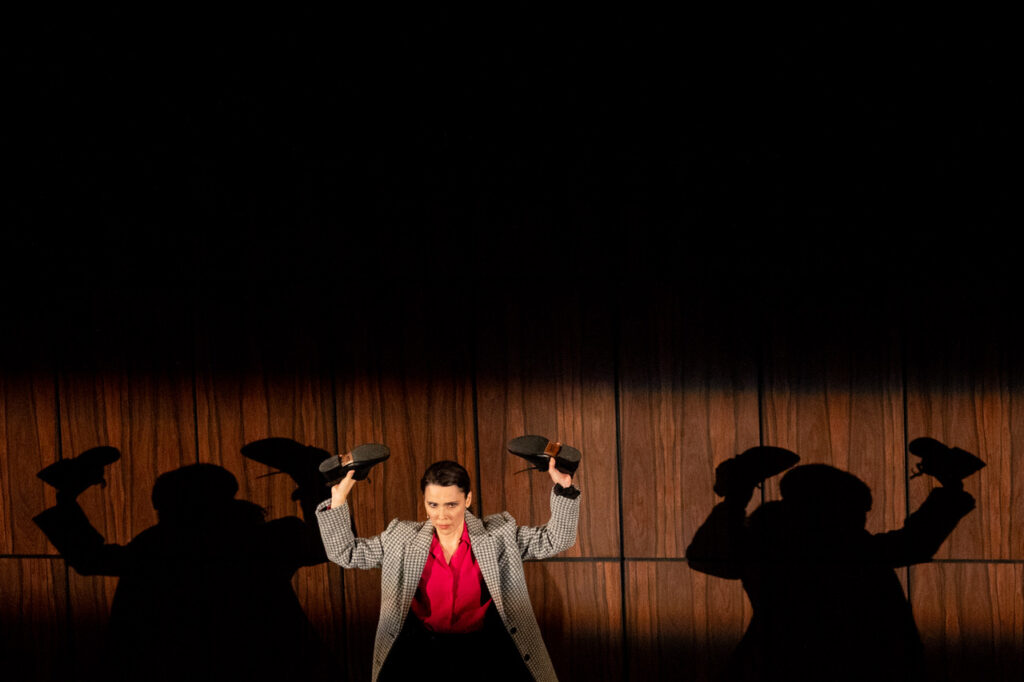Nelson Rodrigues preached that all unanimity is stupid – but the playwright’s maxim deserves to be questioned in the face of the show Prima Facie.
Since April, when it premiered in Rio de Janeiro, the monologue by Australian Suzie Miller starring Débora Falabella has been bursting bubbles and receiving nominations for major awards.
Some may think it’s exaggerated or overly enthusiastic because of an urgent social issue. No, it’s all well-deserved. Believe it.
Playing at Teatro Vivo in São Paulo, the production directed by Yara de Novaes reveals itself to be a collection of successes, and among them, one stands out to the audience.
At 45, Débora Falabella is at the peak of her technique and sensitivity as an actress, a level of maturity only possible through the constant practice of her craft in three decades of her career.
Her triumphant performance as lawyer Tessa Ensler is the result of a balanced and continuous work. A common name on television, the actress has never strayed from the stage and has accumulated significant roles in cinema. She has done at least 14 plays, 15 films, 11 soap operas, and 10 series, a rare baggage in her generation.
“It’s a life choice and it can’t be any different,” Débora told Brazil Journal. “Many times I rehearsed a play in the final stretch of a soap opera and, despite being exhausted, I gave up rest to premiere it right after.”
The character in Prima Facie is also a diligent worker. She overcame humble origins and, proud of her professional achievements, she doesn’t give in to anyone in the male-dominated world of the courts. Winning the case and defending the “truth” of her clients is what matters. Cold and practical, Tessa uses persuasion to absolve even those accused of sexual abuse – which puts her in an ethical limbo. “I was trained to think differently,” she justifies. “It’s my job.”
Thanks to Débora’s performance, Tessa gains the audience’s understanding, and many come to admire her. The lawyer grew up in a dysfunctional family and remains unfazed by setbacks. One day, she starts dating a colleague from the office who, after a drunken night, rapes her. The tragedy humanizes her, and her pragmatism crumbles. “The audience celebrates most of the play with the character’s victories and falls along with her into the abyss when the conflict is triggered,” says the actress.
Tessa exposes the abuser and feels firsthand how her accusation can be dismantled by a cunning defense attorney, just as she has done so many times. Débora’s multiple skills shine on stage. If in the first part Tessa boasted of her successes, after the dramatic turn she becomes another woman, fragile and insecure.
“Débora’s training effect and how she proves herself capable in the most complex scenes are very visible,” praises Yara de Novaes. “She is an actress who does not bring a TV language to the stage and leads the audience to a place of invention.”
Suzie Miller’s skillful dramaturgy greatly contributes to stimulating the audience’s reasoning. It is rare to find a monologue populated by so many characters, many of them with their own issues and conflicts that enhance the protagonist’s story and the viewer’s perspective.
The set by André Cortez, which unravels as the character’s convictions are shaken, the lighting designed by Wagner Antonio, and the soundtrack composed by Morris expand the meanings of the production.
Prima Facie is justified by touching on a wound with depth and consistency. The crime of sexual violence is not brought to the stage in a discursive or verbose manner, common in other productions. “The play shows that the rapist is not just that man who can attack you on a dark street,” says Yara. “Most abusers are within the home or close to the victim.”
Prima Facie caused a mobilization in the political and judicial spheres. After watching the show in Rio de Janeiro, former Attorney General Raquel Dodge organized a presentation in Brasília, followed by a debate with Minister Cármen Lúcia and former Supreme Court Justice Carlos Ayres Britto. “It’s gratifying to see that a work can contribute to the revision of laws created by men to benefit men,” says Débora.
There is much talk about the social function of art. The ambition to engage a production through relevant themes, however, commonly results in preachy and unpalatable narratives. Before being a feminist piece with relevant themes, Prima Facie is a very well-told story, intelligently directed and starring an actress at the top of her game.
In the face of this excellent theater, women will feel welcomed, and some men may rethink their attitudes.

Source
Arwen Volkov, A graduate of the University of St. Gallen in Switzerland with a degree in International Finance, Arwen specializes in sustainable finance and green investments. She began her career at an investment bank in London, where she developed financing models for environmentally friendly projects. Known for her analytical and strategic thinking skills, Arwen is a sought-after financial consultant. In her spare time, she mentors fintech startups, contributing to their growth strategies. She is also a nature enthusiast and an amateur photographer.
